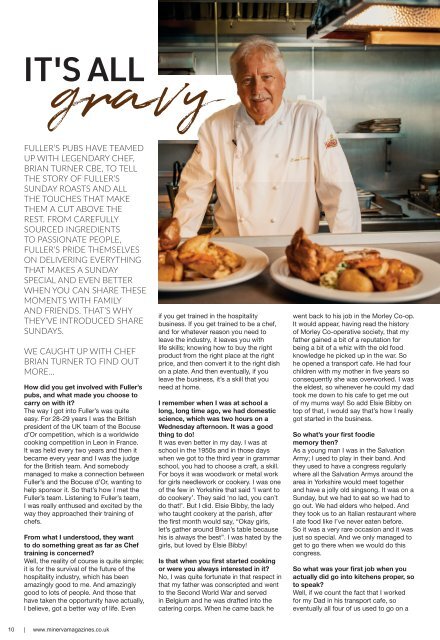Cheltenham Living Mar - Apr 2022
Spring has sprung! This edition is a celebration of the best of it - great food, cracking competitions, Easter bakes, a classic chef interview and an amazing bathroom transformation.
Spring has sprung! This edition is a celebration of the best of it - great food, cracking competitions, Easter bakes, a classic chef interview and an amazing bathroom transformation.
Create successful ePaper yourself
Turn your PDF publications into a flip-book with our unique Google optimized e-Paper software.
gravy<br />
IT'S ALL<br />
FULLER’S PUBS HAVE TEAMED<br />
UP WITH LEGENDARY CHEF,<br />
BRIAN TURNER CBE, TO TELL<br />
THE STORY OF FULLER’S<br />
SUNDAY ROASTS AND ALL<br />
THE TOUCHES THAT MAKE<br />
THEM A CUT ABOVE THE<br />
REST. FROM CAREFULLY<br />
SOURCED INGREDIENTS<br />
TO PASSIONATE PEOPLE,<br />
FULLER’S PRIDE THEMSELVES<br />
ON DELIVERING EVERYTHING<br />
THAT MAKES A SUNDAY<br />
SPECIAL AND EVEN BETTER<br />
WHEN YOU CAN SHARE THESE<br />
MOMENTS WITH FAMILY<br />
AND FRIENDS. THAT’S WHY<br />
THEY’VE INTRODUCED SHARE<br />
SUNDAYS.<br />
WE CAUGHT UP WITH CHEF<br />
BRIAN TURNER TO FIND OUT<br />
MORE...<br />
How did you get involved with Fuller’s<br />
pubs, and what made you choose to<br />
carry on with it?<br />
The way I got into Fuller’s was quite<br />
easy. For 28-29 years I was the British<br />
president of the UK team of the Bocuse<br />
d’Or competition, which is a worldwide<br />
cooking competition in Leon in France.<br />
It was held every two years and then it<br />
became every year and I was the judge<br />
for the British team. And somebody<br />
managed to make a connection between<br />
Fuller’s and the Bocuse d’Or, wanting to<br />
help sponsor it. So that’s how I met the<br />
Fuller’s team. Listening to Fuller’s team,<br />
I was really enthused and excited by the<br />
way they approached their training of<br />
chefs.<br />
From what I understood, they want<br />
to do something great as far as Chef<br />
training is concerned?<br />
Well, the reality of course is quite simple;<br />
it is for the survival of the future of the<br />
hospitality industry, which has been<br />
amazingly good to me. And amazingly<br />
good to lots of people. And those that<br />
have taken the opportunity have actually,<br />
I believe, got a better way of life. Even<br />
if you get trained in the hospitality<br />
business. If you get trained to be a chef,<br />
and for whatever reason you need to<br />
leave the industry, it leaves you with<br />
life skills; knowing how to buy the right<br />
product from the right place at the right<br />
price, and then convert it to the right dish<br />
on a plate. And then eventually, if you<br />
leave the business, it’s a skill that you<br />
need at home.<br />
I remember when I was at school a<br />
long, long time ago, we had domestic<br />
science, which was two hours on a<br />
Wednesday afternoon. It was a good<br />
thing to do!<br />
It was even better in my day. I was at<br />
school in the 1950s and in those days<br />
when we got to the third year in grammar<br />
school, you had to choose a craft, a skill.<br />
For boys it was woodwork or metal work<br />
for girls needlework or cookery. I was one<br />
of the few in Yorkshire that said ‘I want to<br />
do cookery’. They said ‘no lad, you can’t<br />
do that!’. But I did. Elsie Bibby, the lady<br />
who taught cookery at the parish, after<br />
the first month would say, “Okay girls,<br />
let’s gather around Brian’s table because<br />
his is always the best”. I was hated by the<br />
girls, but loved by Elsie Bibby!<br />
Is that when you first started cooking<br />
or were you always interested in it?<br />
No, I was quite fortunate in that respect in<br />
that my father was conscripted and went<br />
to the Second World War and served<br />
in Belgium and he was drafted into the<br />
catering corps. When he came back he<br />
went back to his job in the Morley Co-op.<br />
It would appear, having read the history<br />
of Morley Co-operative society, that my<br />
father gained a bit of a reputation for<br />
being a bit of a whiz with the old food<br />
knowledge he picked up in the war. So<br />
he opened a transport cafe. He had four<br />
children with my mother in five years so<br />
consequently she was overworked. I was<br />
the eldest, so whenever he could my dad<br />
took me down to his cafe to get me out<br />
of my mums way! So add Elsie Bibby on<br />
top of that, I would say that’s how I really<br />
got started in the business.<br />
So what’s your first foodie<br />
memory then?<br />
As a young man I was in the Salvation<br />
Army; I used to play in their band. And<br />
they used to have a congress regularly<br />
where all the Salvation Armys around the<br />
area in Yorkshire would meet together<br />
and have a jolly old singsong. It was on a<br />
Sunday, but we had to eat so we had to<br />
go out. We had elders who helped. And<br />
they took us to an Italian restaurant where<br />
I ate food like I’ve never eaten before.<br />
So it was a very rare occasion and it was<br />
just so special. And we only managed to<br />
get to go there when we would do this<br />
congress.<br />
So what was your first job when you<br />
actually did go into kitchens proper, so<br />
to speak?<br />
Well, if we count the fact that I worked<br />
for my Dad in his transport cafe, so<br />
eventually all four of us used to go on a<br />
10 | www.minervamagazines.co.uk


















